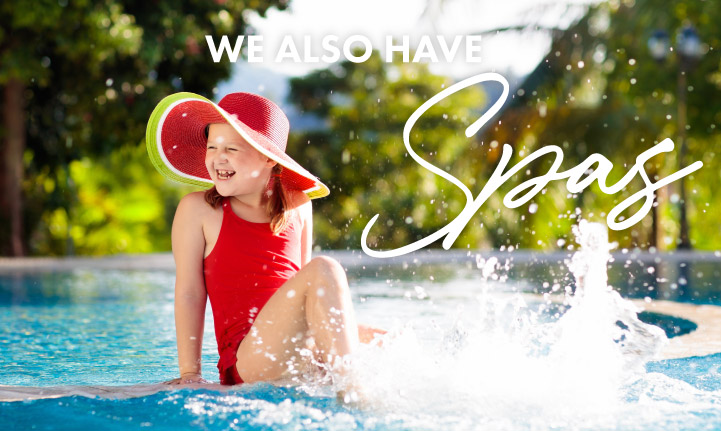Swimming pools are a truly fantastic luxury, offering a private oasis for exercise, relaxation, and entertainment. Whether it's a refreshing dip on a hot summer day or a tranquil escape from the outside world, pools provide endless enjoyment. However, to maintain a safe and pleasant swimming environment, it is crucial to address the perennial issue of pool sanitisation. This article delves into various pool sanitisation options, exploring the pros and cons of each method. From traditional chlorine treatments to innovative UV and ozone systems, we provide a comprehensive guide to enhancing your pool's cleanliness, safety, and overall experience. So dive in and discover the best practices for maintaining a pristine and inviting pool that everyone can enjoy!
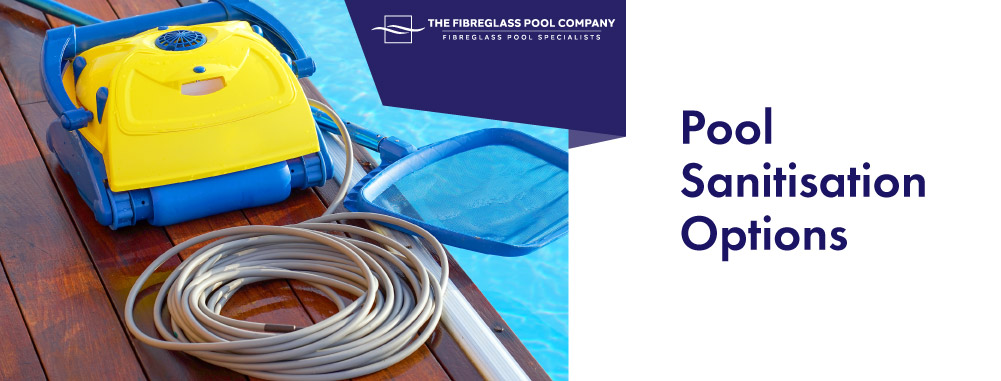
Chlorine
Chlorine, the time-honoured and extensively employed pool sanitiser, has long been acclaimed for its unparalleled efficacy in eliminating bacteria and algae, ensuring the crystal-clear and unpolluted state of pool water. Available in versatile forms such as liquid, tablets, sticks, or granules, chlorine is commonly included in chemical kits, offering effortless pool maintenance solutions. Although widely embraced, it is worth noting that some individuals may find the scent of chlorine disagreeable, while its potential harshness can occasionally lead to skin and eye irritation. It is important to consider these aspects when deliberating on the optimal pool sanitisation approach for your needs.
Bromine
Bromine is a highly effective chlorine alternative that functions similarly in eliminating bacteria and algae. Unlike chlorine, bromine is known for its mildness on the skin and eyes, and it does not emit a strong odour. However, it is important to note that bromine may be less effective in outdoor pools that are exposed to high temperatures and intense sunlight. In such conditions, the efficacy of bromine may be compromised, making it a less suitable choice for outdoor pool maintenance.
Saltwater Systems
Saltwater systems are becoming increasingly popular as a more natural and skin-friendly alternative for sanitisation. These systems operate by utilising electrolysis to convert salt into chlorine, providing an effective and eco-friendly way to maintain water hygiene. While the initial installation costs may be slightly higher compared to traditional chlorine systems, saltwater systems offer long-term benefits such as lower running costs and reduced maintenance requirements. By choosing a saltwater system, you can enjoy the advantages of a cleaner and more sustainable water treatment solution.
UV Systems
UV systems, also known as ultraviolet systems, employ the power of ultraviolet light to effectively eliminate harmful microorganisms and inhibit the growth of algae in pools. These systems are commonly used in combination with other sanitisation methods to ensure comprehensive pool water sanitisation. Though UV systems alone do not provide complete sanitisation, they play a crucial role in maintaining a clean and hygienic swimming environment.
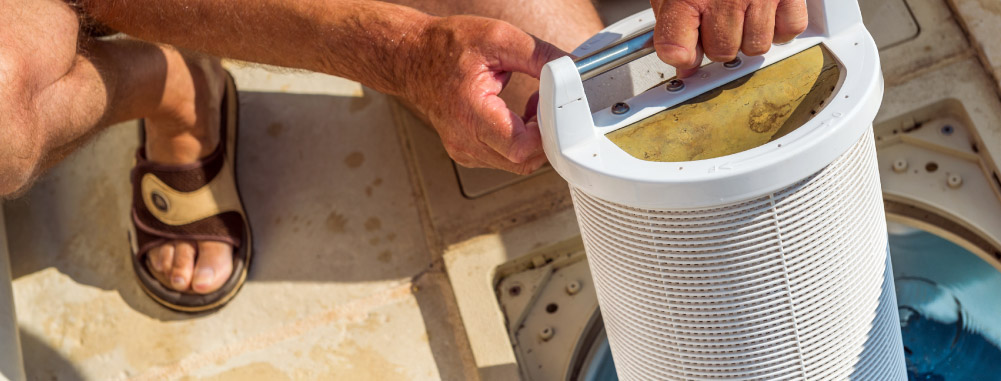
Ozone Generators
Ozone generators are highly effective devices that utilise ozone gas to efficiently break down bacteria and eliminate other impurities present in various settings. In the context of pool water sanitisation, ozone generators are commonly used in conjunction with other sanitisation methods. It’s worth noting that while ozone generators excel at providing immediate and thorough sanitisation, they do not offer long-lasting residual sanitation in the pool water. Therefore, incorporating ozone generators as part of a comprehensive sanitiaation strategy ensures optimal cleanliness and hygiene levels for a safe and enjoyable pool experience.
Ionisation Systems
Ionisation systems, although less common, are a viable alternative for pool sanitation. These systems use copper and silver ions to eliminate bacteria, algae, and viruses present in the water. The ions attack and disrupt the cell processes of these microorganisms, killing them and preventing their multiplication. One of the benefits of ionisation systems is that they do not require the usage of harsh chemicals, making them an appealing choice for those seeking a more eco-friendly solution. Nevertheless, it’s crucial to note that ionisation systems are often used in conjunction with other methods, as they do not provide a residual sanitising effect.
Mineral Water Systems
Mineral water systems utilise minerals, such as magnesium and potassium, to sanitise your pool. These minerals work together to break down bacteria and algae. They offer an attractive sanitisation option due to their gentle properties, causing less skin and eye irritation compared to traditional sanitisation methods. Furthermore, these systems are known for enhancing the swimming experience by leaving the skin feeling soft and reducing the occurrence of red eyes. Nonetheless, like many other alternatives, mineral water systems do not provide a residual effect and are often used in conjunction with other sanitisation methods.
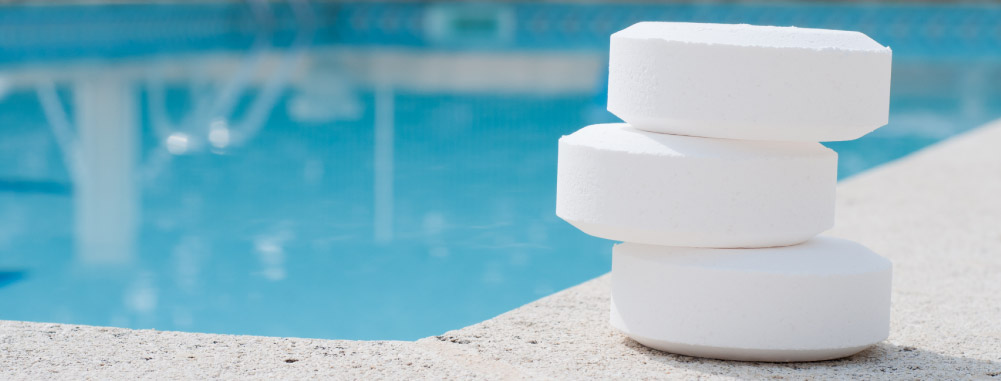
Automated Pool Cleaning Systems
To complement your pool sanitisation efforts, it is also critical to keep your pool clean from physical debris. Automated pool cleaning systems, such as robotic cleaners, suction cleaners, and pressure cleaners, can significantly ease the pool cleaning process. Each system functions differently with different benefits and costs, so careful consideration is necessary when selecting an appropriate option. These cleaning systems can seamlessly integrate with your sanitisation methods, ensuring a thoroughly clean and safe swimming environment.
Importance of Regular Water Testing
Regular water testing is pivotal in ensuring complete pool sanitation. By testing your pool water periodically, you can monitor the effectiveness of your chosen sanitisation method and make necessary adjustments to maintain optimal water balance and hygiene. Water testing kits and digital testers are widely available and provide an easy means of regularly checking your pool’s pH levels, sanitation levels, and overall water quality.
Ionisers
Ionisers are highly effective in sanitising pool water. They achieve this by releasing copper and silver ions that work to eliminate algae, bacteria, and viruses. This method provides long-lasting sanitation, ensuring a safe and healthy swimming environment. Additionally, ionisers are known for their ability to reduce skin and eye irritation, making them a popular choice among pool owners.
When it comes to choosing the right pool sanitisation method, it’s important to consider your individual needs, budget, and the type of pool you have. Each option, including ionisers, chlorine, and saltwater systems, has its own advantages and disadvantages that should be carefully evaluated. By selecting the most suitable method, you not only create a safe swimming environment, but also extend the lifespan of your pool and its equipment.
Investing time and effort into maintaining a properly sanitised pool is crucial for your enjoyment and peace of mind. So, take the necessary steps to ensure that your pool water remains clean, clear, and free from harmful contaminants.
If you are looking for a fibreglass pool to install in your backyard, reach out to the friendly team at The Fibreglass Pool Company!
Swimming pools are a truly fantastic luxury, offering a private oasis for exercise, relaxation, and entertainment. Whether it's a refreshing dip on a hot summer day or a tranquil escape from the outside world, pools provide endless enjoyment. However, to maintain a safe and pleasant swimming environment, it is crucial to address the perennial issue of pool sanitisation. This article delves into various pool sanitisation options, exploring the pros and cons of each method. From traditional chlorine treatments to innovative UV and ozone systems, we provide a comprehensive guide to enhancing your pool's cleanliness, safety, and overall experience. So dive in and discover the best practices for maintaining a pristine and inviting pool that everyone can enjoy!
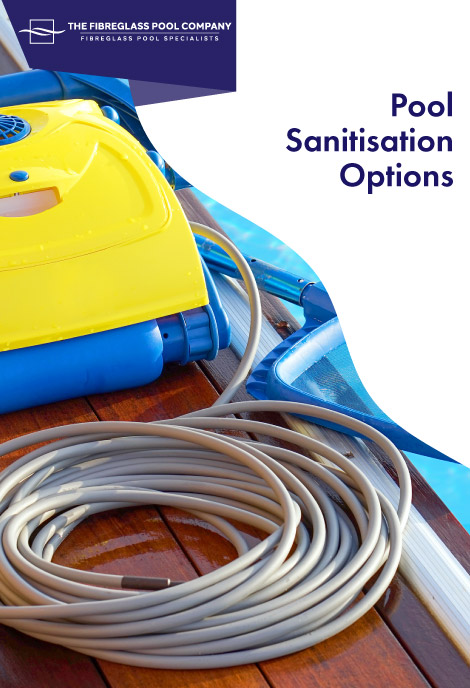
Chlorine
Chlorine, the time-honoured and extensively employed pool sanitiser, has long been acclaimed for its unparalleled efficacy in eliminating bacteria and algae, ensuring the crystal-clear and unpolluted state of pool water. Available in versatile forms such as liquid, tablets, sticks, or granules, chlorine is commonly included in chemical kits, offering effortless pool maintenance solutions. Although widely embraced, it is worth noting that some individuals may find the scent of chlorine disagreeable, while its potential harshness can occasionally lead to skin and eye irritation. It is important to consider these aspects when deliberating on the optimal pool sanitisation approach for your needs.
Bromine
Bromine is a highly effective chlorine alternative that functions similarly in eliminating bacteria and algae. Unlike chlorine, bromine is known for its mildness on the skin and eyes, and it does not emit a strong odour. However, it is important to note that bromine may be less effective in outdoor pools that are exposed to high temperatures and intense sunlight. In such conditions, the efficacy of bromine may be compromised, making it a less suitable choice for outdoor pool maintenance.
Saltwater Systems
Saltwater systems are becoming increasingly popular as a more natural and skin-friendly alternative for sanitisation. These systems operate by utilising electrolysis to convert salt into chlorine, providing an effective and eco-friendly way to maintain water hygiene. While the initial installation costs may be slightly higher compared to traditional chlorine systems, saltwater systems offer long-term benefits such as lower running costs and reduced maintenance requirements. By choosing a saltwater system, you can enjoy the advantages of a cleaner and more sustainable water treatment solution.
UV Systems
UV systems, also known as ultraviolet systems, employ the power of ultraviolet light to effectively eliminate harmful microorganisms and inhibit the growth of algae in pools. These systems are commonly used in combination with other sanitisation methods to ensure comprehensive pool water sanitisation. Though UV systems alone do not provide complete sanitisation, they play a crucial role in maintaining a clean and hygienic swimming environment.
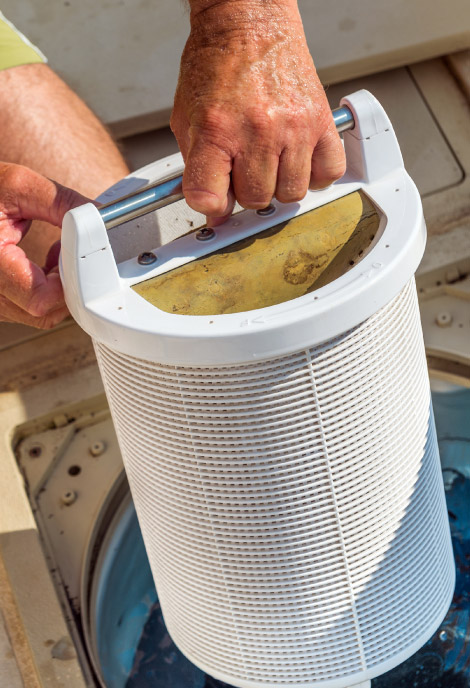
Ozone Generators
Ozone generators are highly effective devices that utilise ozone gas to efficiently break down bacteria and eliminate other impurities present in various settings. In the context of pool water sanitisation, ozone generators are commonly used in conjunction with other sanitisation methods. It’s worth noting that while ozone generators excel at providing immediate and thorough sanitisation, they do not offer long-lasting residual sanitation in the pool water. Therefore, incorporating ozone generators as part of a comprehensive sanitiaation strategy ensures optimal cleanliness and hygiene levels for a safe and enjoyable pool experience.
Ionisation Systems
Ionisation systems, although less common, are a viable alternative for pool sanitation. These systems use copper and silver ions to eliminate bacteria, algae, and viruses present in the water. The ions attack and disrupt the cell processes of these microorganisms, killing them and preventing their multiplication. One of the benefits of ionisation systems is that they do not require the usage of harsh chemicals, making them an appealing choice for those seeking a more eco-friendly solution. Nevertheless, it’s crucial to note that ionisation systems are often used in conjunction with other methods, as they do not provide a residual sanitising effect.
Mineral Water Systems
Mineral water systems utilise minerals, such as magnesium and potassium, to sanitise your pool. These minerals work together to break down bacteria and algae. They offer an attractive sanitisation option due to their gentle properties, causing less skin and eye irritation compared to traditional sanitisation methods. Furthermore, these systems are known for enhancing the swimming experience by leaving the skin feeling soft and reducing the occurrence of red eyes. Nonetheless, like many other alternatives, mineral water systems do not provide a residual effect and are often used in conjunction with other sanitisation methods.
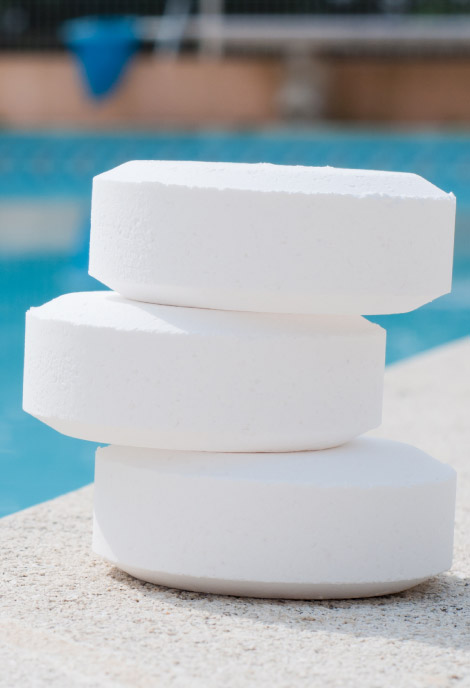
Automated Pool Cleaning Systems
To complement your pool sanitisation efforts, it is also critical to keep your pool clean from physical debris. Automated pool cleaning systems, such as robotic cleaners, suction cleaners, and pressure cleaners, can significantly ease the pool cleaning process. Each system functions differently with different benefits and costs, so careful consideration is necessary when selecting an appropriate option. These cleaning systems can seamlessly integrate with your sanitisation methods, ensuring a thoroughly clean and safe swimming environment.
Importance of Regular Water Testing
Regular water testing is pivotal in ensuring complete pool sanitation. By testing your pool water periodically, you can monitor the effectiveness of your chosen sanitisation method and make necessary adjustments to maintain optimal water balance and hygiene. Water testing kits and digital testers are widely available and provide an easy means of regularly checking your pool’s pH levels, sanitation levels, and overall water quality.
Ionisers
Ionisers are highly effective in sanitising pool water. They achieve this by releasing copper and silver ions that work to eliminate algae, bacteria, and viruses. This method provides long-lasting sanitation, ensuring a safe and healthy swimming environment. Additionally, ionisers are known for their ability to reduce skin and eye irritation, making them a popular choice among pool owners.
When it comes to choosing the right pool sanitisation method, it’s important to consider your individual needs, budget, and the type of pool you have. Each option, including ionisers, chlorine, and saltwater systems, has its own advantages and disadvantages that should be carefully evaluated. By selecting the most suitable method, you not only create a safe swimming environment, but also extend the lifespan of your pool and its equipment.
Investing time and effort into maintaining a properly sanitised pool is crucial for your enjoyment and peace of mind. So, take the necessary steps to ensure that your pool water remains clean, clear, and free from harmful contaminants.
If you are looking for a fibreglass pool to install in your backyard, reach out to the friendly team at The Fibreglass Pool Company!

